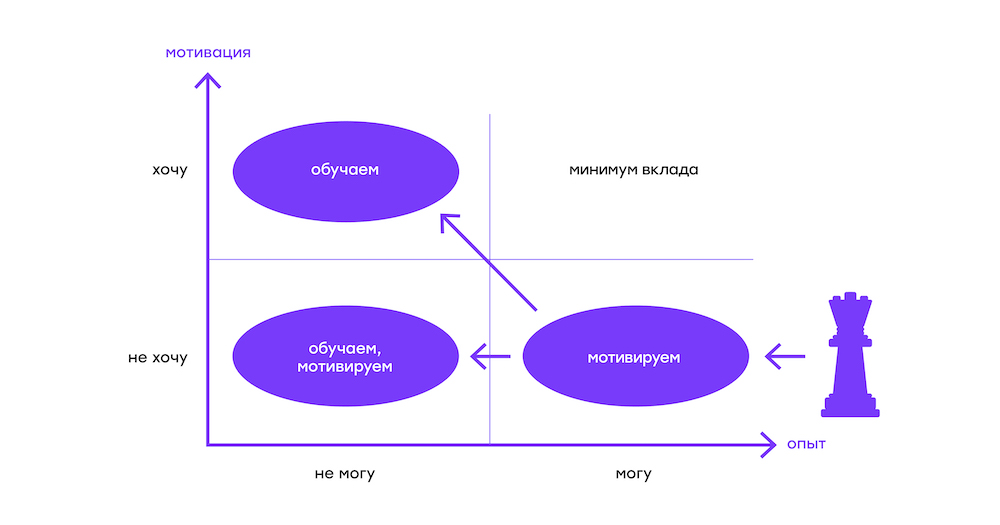Delegation as a manager tool
In the field of people management (where many of us IT people often come suddenly), there are a lot of tools and approaches. Some of them are basic, others follow. But one way or another, a huge number of novice managers discover tools for trial and error management.

Delegation is one of the basic tools of a leader that most people know about. But they often turn to him too late, believing that "the time has not yet come to delegate - there are plenty of other things." Unfortunately, this can lead to not very good results.
In the article I will tell you what delegation is, why it is needed and when to start delegating, how to delegate correctly and where you can get firewood, how it all relates to situational management and how to act. In the end, I will share my own know-how in the field of delegation, I hope that this will be useful to each reader.
Welcome to cat!
My name is Ilya Ageev, I have been working at Badoo for almost eight years, I head a large department responsible for quality control. At the moment, nearly 80 people are subordinate to me. This article is a transcript of my Techleads Meetup talk organized by Badoo on May 19, 2018. It will be useful to a wide audience, regardless of whether you are managing now or not.
So let's go!
First, let's define delegation. In this, as in many other cases, Wikipedia will help .
So remember.
When it comes to delegation, the first thing I remember is the story of Henry Ford. I don’t know if this is true or not (it’s quite possible that this is just a bike), but the story is beautiful.

Once Henry Ford decided to send all managers of all levels on a two-week cruise on the Caribbean Sea. Excuses were not accepted - everyone went on a trip in a voluntary-compulsory manner. When the managers returned, some were waiting for an increase, while others - dismissal.
What was Ford based on? On the quality of the work of departments that were temporarily left without managers. Those managers whose units continued to operate normally were awarded. If, in the absence of the manager, everything fell out of the hands of the employees, the work did not go and the processes broke, it means that the manager was unable to establish work and such managers should be fired.
In general, there is nothing complicated in delegation. I am sure that most readers are constantly confronted with delegation and somehow use this tool daily in their work.
However, sometimes incidents occur due to the misuse of the delegation tool. Apparently, because everything seems too obvious, understandable and proceeding from the most common sense.
I think many people saw this picture from the Network, on which everyone “delegated” everything, and only Vasya works in the end:

And this one, on which workflows are organized in separate departments, but the company as a whole is clearly moving somewhere else:

And here’s another one on which everything looks structurally correct, everyone is in their places, but at the same time people feel, to put it mildly, not very:

Why is this happening? Why do such management errors occur? Let's dig deeper.
We return to the definition of delegation and read it carefully. What catches the eye in the first place?
Delegation is the transfer of part of the functions of a leader ... The layman immediately thinks: “Oh, cool! I want the functions of a leader! The boss - he’s so cool! He sits in his office, his secretary wears coffee. The boss decides who to hire and who to fire. Fulfills the fate of people! I also WANT this! ”
But in reality, the matter is not limited to the transfer of powers. And certainly the leader, in addition to drinking coffee, is doing something else. Spoiler: a lot more.
Let's turn to smart people and see what they think about delegation. For example, Henri Fayolle , a French mining engineer, theorist and practitioner of management, one of the founders of the "classical school" of management, believes this:
And if you think carefully, it becomes clear that the main thing in delegation is responsibility. Everything else - authority, decision-making right, resources, people, processes - follows and serves only the purpose of implementing delegated responsibility.
It is possible to give powers without responsibility, but this can lead to disastrous consequences. And to give responsibility without authority means to put the contractor in a hopeless situation, because he will not be able to realize the delegated responsibility.
Thus, we conclude that responsibility and authority for its implementation should be delegated only together. In this case, powers should be delegated exactly as much as is necessary for the implementation of responsibility. Give less authority - there is a huge risk that the case will not be done. Give more - there is a risk of abuse of authority .
By the way, in the English-language Wikipedia, the definition of delegation contains the word “responsibility”. It is strange that in the Russian version it was lost.
In one of the sources that I studied during the preparation of my report, I found this list of reasons for delegation:
To me, it looks a little strange, especially the last point. Therefore, I will leave this list without comment, and instead I will offer my list of reasons for delegation.
Professional growth of employees . Obviously, if you do not share with your subordinates part of the work that you do every day, they will never learn how to do it. The same applies to you as a leader: if you do not delegate, then you will never learn this. By refusing to delegate, you are slowing down both your growth and the growth of your employees, and the growth of the company as a whole.
Fresh look and continuous development . These are vital conditions for both you and the entire company. There are several practices, for example:
The weakening of the bus factor. We are all humans. No one is safe from illness, emergency cases and other force majeure. Everyone can have a vacation. Finally, they can fire us. And delegation is a direct way to minimize risks both for the company as a whole and for your department in particular.
Probably many are asking this question. “I am a manager, I have one person subordinate. Can I start delegating? ”Or“ I’m a manager, I have five people on my team. Do we have to wait until there will be six? ”
Let's talk about the upper limit. British scientist Robin Dunbar managed to mathematically calculate that the size of a portion of the cerebral cortex of higher primates, called the neocortex, linearly correlates with the number of social connections that they can maintain. For people, this limit is about 150 connections. This value is also called the Dunbar number.
This number includes your relatives, childhood friends, neighbors, colleagues, children, wives / husbands and your employees with whom you meet daily at work. 150 social connections - the physiological limit, for someone it is a little more, for someone a little less.
They say that Alexander the Great knew in the face of each of his warriors, but, most likely, this is only a beautiful legend.
Is there any realistic number - the number of people who are comfortable working with? Again, physiology comes to the rescue. The American psychologist George Miller deduced this pattern: our short-term memory (operational) can only operate with a family (± 2) of values per unit time. This phenomenon is called the "magic number seven plus or minus two," or "Miller's wallet."
This observation correlates with the experience of many of us. So, 6-12 people - this is the optimal size of the department. If there are more people, it becomes much more difficult to manage them. Especially if you have newcomers or processes are not yet configured properly.
Nevertheless, my experience shows that sometimes a large number of people can operate well. One of my employees, who runs the department in my area of responsibility, has 20 people directly reporting and copes well with them. But I think this is the exception rather than the rule.
So when do you start delegating? In fact, no waiting. You can start, even if you are alone. As soon as a piece of responsibility has been delegated to you, all the causes and risks that we mentioned earlier immediately appear. Therefore, the risks should be minimized.
Therefore, let's talk about how to and how not to transfer authority and responsibility.
First, consider what mistakes managers make when delegating.

Many beginning managers immediately have a question, which in itself is a big mistake: “ If I delegate everything that I am valued and loved for, then I will cease to be irreplaceable. Why then will I need a company? I can be fired . "
It is important to remember two things. First: as a manager, you must take care of the risks. If it turns out that you are the only person who can do something within the framework of certain tasks, then you took the company “hostage”. So you are an enemy of your own company. In no case should this be done. Second: the more you delegate, the more you will gain. There will be new tasks for which you did not have time before. After all, you had no time even to raise your head from the routine and look around, think about the fact that the company may have problems of a different scale and that there are important strategic tasks that also need to be addressed.
How to do it right? Let's look at it also point by point.
We found out what is good and what is bad, where to start and how to act in different situations. But is something required from employees so that the manager can delegate authority to them?
Management theory has two concepts of transfer of authority and responsibility.
The first is the so-called classic concept, when authority and responsibility are transferred from top to bottom. This includes orders, clear instructions, step-by-step instruction. Like in the army: the boss ordered to roll square or wear round - be kind to carry out without thinking about why you need to do just that.
The second is the concept of acceptance of authority and responsibility, which was formulated by Chester Bernard, president of the Bell Telephone Company in New Jersey. According to her, powers can be transferred from top to bottom and back, that is, a subordinate may accept authority and responsibility, but may not accept. Within the framework of this concept, it is necessary to convince a person to do what you need to "sell" the idea.
How to act correctly? True, as always, somewhere in between.
A model of situational leadership comes to the rescue, which was formulated by two Americans: Paul Hersey, an ethologist and entrepreneur, and Ken Blanchard, author of books and an expert in management. In the 1960s, they wrote the general work Management of organizational behavior, in which they formulated a model that takes into account employee motivation and experience.
The authors argue that there is no single right leadership style that fits absolutely everyone in any situation. On the contrary, according to the model, leadership style depends on a specific task and a specific artist.

Here the model is represented by large strokes, of course, there may be transition states in it. But for a general understanding of this gradation is enough.
In the latter case, it is easiest to delegate, but in fact, it is possible to delegate responsibilities to any member of the team, only the resources
will be different.
Probably, you would like all your employees to be from the “I want - I can” group, but the harsh truth of life is that this is far from always and working with the bulk of your team requires a lot of effort. Especially with those who do not want and cannot.
Therefore, we often think: “ I myself must first work very hard and try before delegating something to someone. And then you still have to constantly monitor him, to make sure that he is doing the right thing". Typically, such thoughts arise if you linearly evaluate the task or the resources at your disposal, if it seems to you that you and only you can distribute tasks to your employees, explain, motivate and control them. This is a big mistake.
As a manager, you have much more resources. Indeed, in all these daily tasks your employees can help you.
Let's look at the diagram in a slightly different section. What do we need to do for employees whose motivation or expertise on specific tasks is not at the highest level?

Such employees need to be trained, motivated, and those who belong to the category “I do not want - I can’t” must be trained and motivated at the same time. And nobody canceled the control.
What if, for example, we try to build a learning process and automate controls to reduce the amount of work?
This, by the way, is a very important point. When you build a process, you need to focus primarily on the performers who need to be motivated, supervised and trained. Those who need to invest in a minimum can cope, even if there is no process as such.

As for the delegation of tasks, let's start with the simplest. Why don't we build this process in such a way that people who need a minimum of effort to help with help train those who are highly motivated but have no skills? After all, this group of employees has the necessary expertise for professional work.
Such specialists can help in creating the process of onboarding of employees, in teaching beginners the necessary skills for working in a team, etc. Special documentation and step-by-step instructions are needed here so that such tasks take a minimum of time in the future both from you and other experts in the department .

Or can such people help motivate the “Don't Want” group? We talked about motivation and “burnout” at the next Techleads Meetup in Badoo on June 15, 2019. Many of the things discussed there can also be delegated.
And even those who have lost motivation, but have expertise, can also be involved in the learning process. Many would love to share their experience, thereby increasing their involvement in a common cause. The burning eyes of colleagues who look at the expert and listen with open mouth what he is talking about are very good motivators.

I assure you that the motivation will increase for many of those who feel that the team needs it, that their experience is not only necessary for the performance of routine work, that other employees begin to respect, love and value him even more for helping him solve everyday problems. They can easily move from the group “I don't want - I can” to the group “I want - I can”.
And then everything is simple, because the delegation processes can be performed in parallel. We simply attract subordinates to solving problems that you previously preferred to solve alone.

And we smoothly came to the fact that delegation is the same managerial function as any other. Surprisingly, it can also be delegated.

Probably some of you had the idea that everything is complicated. “If I want to delegate a task, I’ll have to open an article, look at all these points, try on these rules again. Is it possible somehow easier? Is there some kind of pattern that will help me evaluate tasks? I would understand that this is suitable, but this is not, this must be done in the first place, this is in the second . ”
Such a pattern really is. This is the very know-how that I spoke about at the very beginning.
Imagine that right now the boss, the owner of the company, the highest boss calls you and says: “Vasya, leave the building. There is a car. She will take you to the airport. A private plane awaits there. He will take you to an island in the Caribbean, where you will spend some time. We have already warned your loved ones. But you can’t report to work in any way . ”
Ask yourself, what will break down in your department or company? Imagine that you are absent for a day, three days, a week, a month, a year. Imagine that you went on a cruise for life. This way you get a prioritized list of things that you must delegate.
I hope that I managed to convey to the reader the thesis that delegation is not difficult. Yes, it can be done wrong. But how to do it right, we now also figured out.
I just want to remind you that delegation and all of the above are not the only strategies for working with people. This is not a panacea. The manager’s arsenal has many more tools. Look wider and make the most of the resources you have.
Thanks for attention!
- Links to the sources used to prepare the report:
https://studopedia.org/14-71669.htm l
https://en.wikipedia.org/wiki/Depending_of_authorizations
http://helpiks.org/3-32518.html
https://ru.wikipedia.org/wiki/Kaizen
https://www.cfin.ru/management/people/labor_law/authority_delegation.shtml
https://studfiles.net/preview/908897/
https://sites.google.com/a/avlc.ru/spm/courses / plan / modul_08
https://studfiles.net/preview/908897/
https://cyberleninka.ru/article/n/plyusy-i-minusy-delegirovaniya-polnomochiy
https://en.wikipedia.org/wiki/The_Magical_Number_Seven , _Plus_or_Minus_Two

Delegation is one of the basic tools of a leader that most people know about. But they often turn to him too late, believing that "the time has not yet come to delegate - there are plenty of other things." Unfortunately, this can lead to not very good results.
In the article I will tell you what delegation is, why it is needed and when to start delegating, how to delegate correctly and where you can get firewood, how it all relates to situational management and how to act. In the end, I will share my own know-how in the field of delegation, I hope that this will be useful to each reader.
Welcome to cat!
My name is Ilya Ageev, I have been working at Badoo for almost eight years, I head a large department responsible for quality control. At the moment, nearly 80 people are subordinate to me. This article is a transcript of my Techleads Meetup talk organized by Badoo on May 19, 2018. It will be useful to a wide audience, regardless of whether you are managing now or not.
So let's go!
First, let's define delegation. In this, as in many other cases, Wikipedia will help .
Delegation is the process of transferring part of the functions of a manager to other managers or employees to achieve specific goals of the organization.
Wikipedia
So remember.
The story of Henry Ford
When it comes to delegation, the first thing I remember is the story of Henry Ford. I don’t know if this is true or not (it’s quite possible that this is just a bike), but the story is beautiful.

Once Henry Ford decided to send all managers of all levels on a two-week cruise on the Caribbean Sea. Excuses were not accepted - everyone went on a trip in a voluntary-compulsory manner. When the managers returned, some were waiting for an increase, while others - dismissal.
What was Ford based on? On the quality of the work of departments that were temporarily left without managers. Those managers whose units continued to operate normally were awarded. If, in the absence of the manager, everything fell out of the hands of the employees, the work did not go and the processes broke, it means that the manager was unable to establish work and such managers should be fired.
Delegating is easy!
In general, there is nothing complicated in delegation. I am sure that most readers are constantly confronted with delegation and somehow use this tool daily in their work.
However, sometimes incidents occur due to the misuse of the delegation tool. Apparently, because everything seems too obvious, understandable and proceeding from the most common sense.
I think many people saw this picture from the Network, on which everyone “delegated” everything, and only Vasya works in the end:

And this one, on which workflows are organized in separate departments, but the company as a whole is clearly moving somewhere else:

And here’s another one on which everything looks structurally correct, everyone is in their places, but at the same time people feel, to put it mildly, not very:

Why is this happening? Why do such management errors occur? Let's dig deeper.
We return to the definition of delegation and read it carefully. What catches the eye in the first place?
Delegation is the process of transferring part of the functions of a manager to other managers or employees to achieve specific goals of the organization.
Wikipedia
Delegation is the transfer of part of the functions of a leader ... The layman immediately thinks: “Oh, cool! I want the functions of a leader! The boss - he’s so cool! He sits in his office, his secretary wears coffee. The boss decides who to hire and who to fire. Fulfills the fate of people! I also WANT this! ”
But in reality, the matter is not limited to the transfer of powers. And certainly the leader, in addition to drinking coffee, is doing something else. Spoiler: a lot more.
Responsibility
Let's turn to smart people and see what they think about delegation. For example, Henri Fayolle , a French mining engineer, theorist and practitioner of management, one of the founders of the "classical school" of management, believes this:
Powers should not be considered separately from liability [...]. Responsibility is a consequence of authority.
And if you think carefully, it becomes clear that the main thing in delegation is responsibility. Everything else - authority, decision-making right, resources, people, processes - follows and serves only the purpose of implementing delegated responsibility.
It is possible to give powers without responsibility, but this can lead to disastrous consequences. And to give responsibility without authority means to put the contractor in a hopeless situation, because he will not be able to realize the delegated responsibility.
Thus, we conclude that responsibility and authority for its implementation should be delegated only together. In this case, powers should be delegated exactly as much as is necessary for the implementation of responsibility. Give less authority - there is a huge risk that the case will not be done. Give more - there is a risk of abuse of authority .
By the way, in the English-language Wikipedia, the definition of delegation contains the word “responsibility”. It is strange that in the Russian version it was lost.
Why delegate?
In one of the sources that I studied during the preparation of my report, I found this list of reasons for delegation:
- solving complex problems that others cannot solve;
- increasing employee motivation;
- increasing trust in the team;
- verification of the performance of subordinates.
To me, it looks a little strange, especially the last point. Therefore, I will leave this list without comment, and instead I will offer my list of reasons for delegation.
Professional growth of employees . Obviously, if you do not share with your subordinates part of the work that you do every day, they will never learn how to do it. The same applies to you as a leader: if you do not delegate, then you will never learn this. By refusing to delegate, you are slowing down both your growth and the growth of your employees, and the growth of the company as a whole.
Fresh look and continuous development . These are vital conditions for both you and the entire company. There are several practices, for example:
- kaizen - Japanese practice (and philosophy, as much as the Japanese have) of the continuous development of processes, people and everything that revolves around it;
- Deming cycle (plan-do-check-act, PDCA) - a cyclically repeating decision-making process used in quality management;
- continuous improvement management (CIM) - practices of continuous improvement in Goldratt's theory of constraints.
The weakening of the bus factor. We are all humans. No one is safe from illness, emergency cases and other force majeure. Everyone can have a vacation. Finally, they can fire us. And delegation is a direct way to minimize risks both for the company as a whole and for your department in particular.
When can I start delegating?
Probably many are asking this question. “I am a manager, I have one person subordinate. Can I start delegating? ”Or“ I’m a manager, I have five people on my team. Do we have to wait until there will be six? ”
Let's talk about the upper limit. British scientist Robin Dunbar managed to mathematically calculate that the size of a portion of the cerebral cortex of higher primates, called the neocortex, linearly correlates with the number of social connections that they can maintain. For people, this limit is about 150 connections. This value is also called the Dunbar number.
This number includes your relatives, childhood friends, neighbors, colleagues, children, wives / husbands and your employees with whom you meet daily at work. 150 social connections - the physiological limit, for someone it is a little more, for someone a little less.
They say that Alexander the Great knew in the face of each of his warriors, but, most likely, this is only a beautiful legend.
Is there any realistic number - the number of people who are comfortable working with? Again, physiology comes to the rescue. The American psychologist George Miller deduced this pattern: our short-term memory (operational) can only operate with a family (± 2) of values per unit time. This phenomenon is called the "magic number seven plus or minus two," or "Miller's wallet."
This observation correlates with the experience of many of us. So, 6-12 people - this is the optimal size of the department. If there are more people, it becomes much more difficult to manage them. Especially if you have newcomers or processes are not yet configured properly.
Nevertheless, my experience shows that sometimes a large number of people can operate well. One of my employees, who runs the department in my area of responsibility, has 20 people directly reporting and copes well with them. But I think this is the exception rather than the rule.
So when do you start delegating? In fact, no waiting. You can start, even if you are alone. As soon as a piece of responsibility has been delegated to you, all the causes and risks that we mentioned earlier immediately appear. Therefore, the risks should be minimized.
Therefore, let's talk about how to and how not to transfer authority and responsibility.
Delegation Errors
First, consider what mistakes managers make when delegating.
- The first and most obvious mistake is the lack of delegation. Delegate, do not wait. The “right” moment may never come.
- Delegation to a group without assigning a person in charge. When we talk about delegation, we are primarily talking about responsibility. If you are delegating responsibility to a group of people, then one should be responsible. When everyone is responsible for something, in fact no one is responsible.
- Delegation without considering the capabilities of the contractor. Responsibility and means for its implementation must be given in exactly the amount necessary to solve the problem. If you give less, then the task simply will not be solved.
- Delegation of other people's tasks. If the responsibility is not with you, how can you transfer it to someone else or share it with someone else?
- Delegation of small tasks without specifying a goal. When an employee does not understand the common goal, even if he is trying hard and fulfilling what you asked him to do, it is not a fact that he will arrive in time to the place you need. The converse is also true.
- Delegation of goals without instruction. This happens when you say where you need to come, but do not say how.
- Delegation without timelines. If you entrust an employee with a task and do not indicate the final goal, steps, deadlines, it is very likely that the task will not be solved.
- Delegation without prioritization. See paragraph 7.
- Delegation of uninteresting tasks. Surely among you there are people who find themselves in a situation where the leader of those tasks that he does not like, throws off on others. Do not do like this.
- Lack of feedback or control. This is when you give a task and do not check how a person copes with it.
- Perfectionism and impatience. A very serious and very common error when delegating. This is when you know what you can do better, and constantly approach the person, point out the shortcomings. In fact, you just bother him and achieve the result now, and successfully solve similar problems in the future.
- Finally, a complete transfer of responsibility. Delegation is not a complete transfer of responsibility, but only its sharing with the person to whom you delegate the task. Despite the fact that he is responsible to you for execution, deadlines, quality, no one has removed the responsibility from you. As a result, you will still be accountable to your leadership.

Many beginning managers immediately have a question, which in itself is a big mistake: “ If I delegate everything that I am valued and loved for, then I will cease to be irreplaceable. Why then will I need a company? I can be fired . "
It is important to remember two things. First: as a manager, you must take care of the risks. If it turns out that you are the only person who can do something within the framework of certain tasks, then you took the company “hostage”. So you are an enemy of your own company. In no case should this be done. Second: the more you delegate, the more you will gain. There will be new tasks for which you did not have time before. After all, you had no time even to raise your head from the routine and look around, think about the fact that the company may have problems of a different scale and that there are important strategic tasks that also need to be addressed.
Delegation Rules
How to do it right? Let's look at it also point by point.
- Delegate. Do not wait, use every opportunity, reduce risks. Take care of the growth of your employees and company.
- Choose an artist for the task. The person to whom you delegate authority and responsibility should be suitable for solving the problem both in terms of your professional qualities and involvement.
- Formulate the goal, determine the result, confirm the timeline.
- Identify rights and obligations. Provide the contractor with all the resources necessary to solve the problem.
- Motivate.
- Make sure that the person to whom you delegate responsibilities understands everything correctly.
- Support and control the employee during the execution process.
- Do not forget about automation. This is a very important point. When delegating, managers often think one-sidedly, only about people. In fact, you can delegate to any resource. The simplest example is a calendar, an automated tool to which you delegate the work of remembering and planning your meetings, which also reminds you of events as a personal secretary.
Performers
We found out what is good and what is bad, where to start and how to act in different situations. But is something required from employees so that the manager can delegate authority to them?
Management theory has two concepts of transfer of authority and responsibility.
The first is the so-called classic concept, when authority and responsibility are transferred from top to bottom. This includes orders, clear instructions, step-by-step instruction. Like in the army: the boss ordered to roll square or wear round - be kind to carry out without thinking about why you need to do just that.
The second is the concept of acceptance of authority and responsibility, which was formulated by Chester Bernard, president of the Bell Telephone Company in New Jersey. According to her, powers can be transferred from top to bottom and back, that is, a subordinate may accept authority and responsibility, but may not accept. Within the framework of this concept, it is necessary to convince a person to do what you need to "sell" the idea.
How to act correctly? True, as always, somewhere in between.
Desires and Opportunities
A model of situational leadership comes to the rescue, which was formulated by two Americans: Paul Hersey, an ethologist and entrepreneur, and Ken Blanchard, author of books and an expert in management. In the 1960s, they wrote the general work Management of organizational behavior, in which they formulated a model that takes into account employee motivation and experience.
The authors argue that there is no single right leadership style that fits absolutely everyone in any situation. On the contrary, according to the model, leadership style depends on a specific task and a specific artist.

Here the model is represented by large strokes, of course, there may be transition states in it. But for a general understanding of this gradation is enough.
- "I want - I can not." These are people who have strong motivation, but little experience to solve the problem. Usually these are newcomers who have just started working after graduation, they are directly eager to do something. The method of working with them is instruction. Set clear goals in front of them, teach them, explain some points, control. There is practically no need to motivate them.
- "I do not want - I can not." The leadership style here is coaching. Such people do not know how and do not want for some reason. This is the most difficult category, because such employees need not only to be trained, but also constantly motivated. They need to set clear goals, give them clear orders, instructions, constantly step by step control, but do not forget to explain the reasons for making certain decisions, “sell” ideas and ways to solve problems. Thus, we teach such employees to perform tasks that are facing the department and the company as a whole.
- "I do not want - I can." The right leadership style is engagement. This category includes people who have extensive experience, but for some reason lost motivation. This happens with employees who have long been working in the company and “burned out”. They need to be motivated, “sell” to them ideas, convincing them to complete the task. The emphasis in interacting with them must be done on their motivation.
- "I want - I can." The easiest group for delegation of authority. The leadership style here is called delegation. Such people can set fuzzy goals and pay little attention to how the problem is solved. They need neither support nor motivate. But this does not mean that only these people can be delegated.
In the latter case, it is easiest to delegate, but in fact, it is possible to delegate responsibilities to any member of the team, only the resources
will be different.
Probably, you would like all your employees to be from the “I want - I can” group, but the harsh truth of life is that this is far from always and working with the bulk of your team requires a lot of effort. Especially with those who do not want and cannot.
Therefore, we often think: “ I myself must first work very hard and try before delegating something to someone. And then you still have to constantly monitor him, to make sure that he is doing the right thing". Typically, such thoughts arise if you linearly evaluate the task or the resources at your disposal, if it seems to you that you and only you can distribute tasks to your employees, explain, motivate and control them. This is a big mistake.
As a manager, you have much more resources. Indeed, in all these daily tasks your employees can help you.
Let's look at the diagram in a slightly different section. What do we need to do for employees whose motivation or expertise on specific tasks is not at the highest level?

Such employees need to be trained, motivated, and those who belong to the category “I do not want - I can’t” must be trained and motivated at the same time. And nobody canceled the control.
What if, for example, we try to build a learning process and automate controls to reduce the amount of work?
This, by the way, is a very important point. When you build a process, you need to focus primarily on the performers who need to be motivated, supervised and trained. Those who need to invest in a minimum can cope, even if there is no process as such.

As for the delegation of tasks, let's start with the simplest. Why don't we build this process in such a way that people who need a minimum of effort to help with help train those who are highly motivated but have no skills? After all, this group of employees has the necessary expertise for professional work.
Such specialists can help in creating the process of onboarding of employees, in teaching beginners the necessary skills for working in a team, etc. Special documentation and step-by-step instructions are needed here so that such tasks take a minimum of time in the future both from you and other experts in the department .

Or can such people help motivate the “Don't Want” group? We talked about motivation and “burnout” at the next Techleads Meetup in Badoo on June 15, 2019. Many of the things discussed there can also be delegated.
And even those who have lost motivation, but have expertise, can also be involved in the learning process. Many would love to share their experience, thereby increasing their involvement in a common cause. The burning eyes of colleagues who look at the expert and listen with open mouth what he is talking about are very good motivators.

I assure you that the motivation will increase for many of those who feel that the team needs it, that their experience is not only necessary for the performance of routine work, that other employees begin to respect, love and value him even more for helping him solve everyday problems. They can easily move from the group “I don't want - I can” to the group “I want - I can”.
And then everything is simple, because the delegation processes can be performed in parallel. We simply attract subordinates to solving problems that you previously preferred to solve alone.

And we smoothly came to the fact that delegation is the same managerial function as any other. Surprisingly, it can also be delegated.

Is it possible somehow easier?
Probably some of you had the idea that everything is complicated. “If I want to delegate a task, I’ll have to open an article, look at all these points, try on these rules again. Is it possible somehow easier? Is there some kind of pattern that will help me evaluate tasks? I would understand that this is suitable, but this is not, this must be done in the first place, this is in the second . ”
Such a pattern really is. This is the very know-how that I spoke about at the very beginning.
Imagine that right now the boss, the owner of the company, the highest boss calls you and says: “Vasya, leave the building. There is a car. She will take you to the airport. A private plane awaits there. He will take you to an island in the Caribbean, where you will spend some time. We have already warned your loved ones. But you can’t report to work in any way . ”
Ask yourself, what will break down in your department or company? Imagine that you are absent for a day, three days, a week, a month, a year. Imagine that you went on a cruise for life. This way you get a prioritized list of things that you must delegate.
Conclusion
I hope that I managed to convey to the reader the thesis that delegation is not difficult. Yes, it can be done wrong. But how to do it right, we now also figured out.
I just want to remind you that delegation and all of the above are not the only strategies for working with people. This is not a panacea. The manager’s arsenal has many more tools. Look wider and make the most of the resources you have.
Thanks for attention!
- Links to the sources used to prepare the report:
https://studopedia.org/14-71669.htm l
https://en.wikipedia.org/wiki/Depending_of_authorizations
http://helpiks.org/3-32518.html
https://ru.wikipedia.org/wiki/Kaizen
https://www.cfin.ru/management/people/labor_law/authority_delegation.shtml
https://studfiles.net/preview/908897/
https://sites.google.com/a/avlc.ru/spm/courses / plan / modul_08
https://studfiles.net/preview/908897/
https://cyberleninka.ru/article/n/plyusy-i-minusy-delegirovaniya-polnomochiy
https://en.wikipedia.org/wiki/The_Magical_Number_Seven , _Plus_or_Minus_Two
